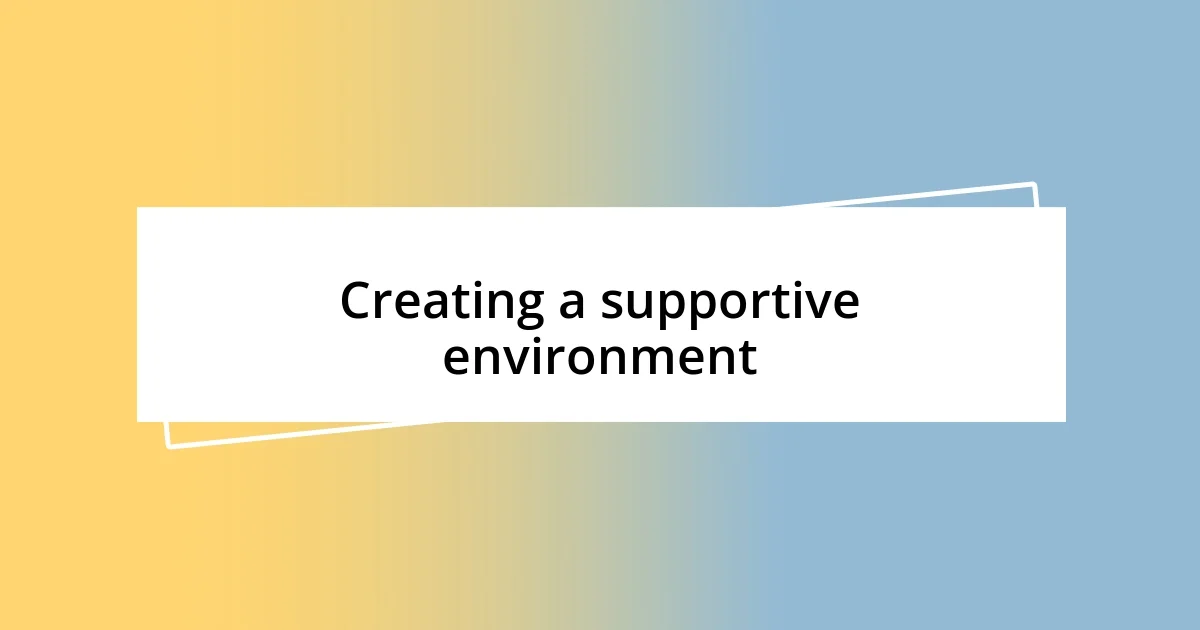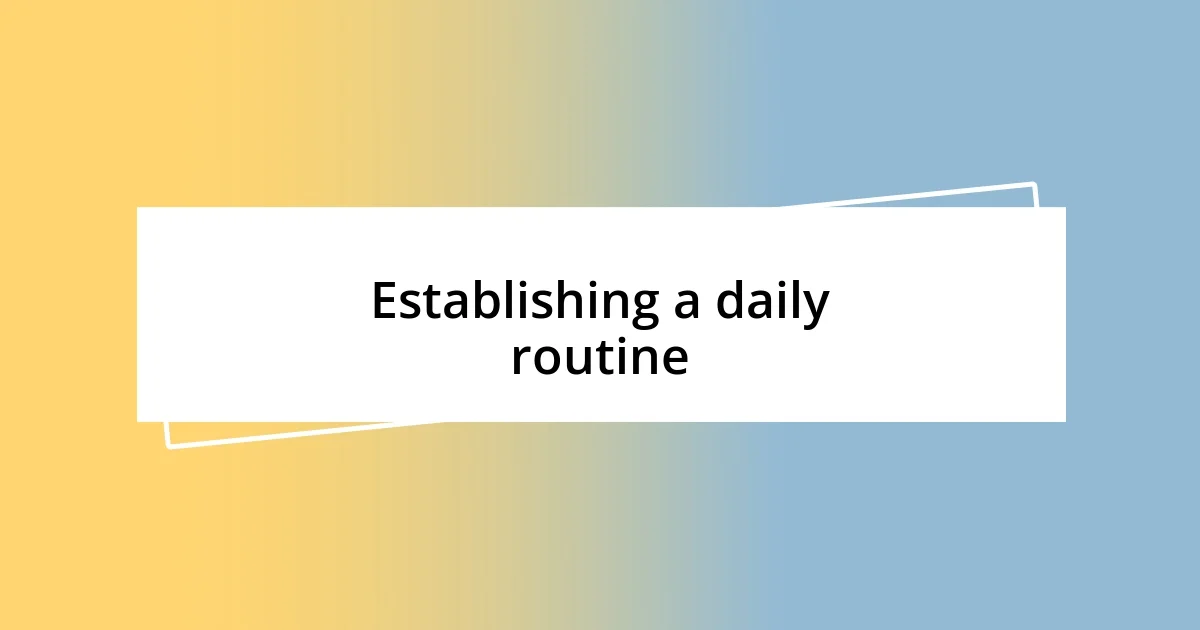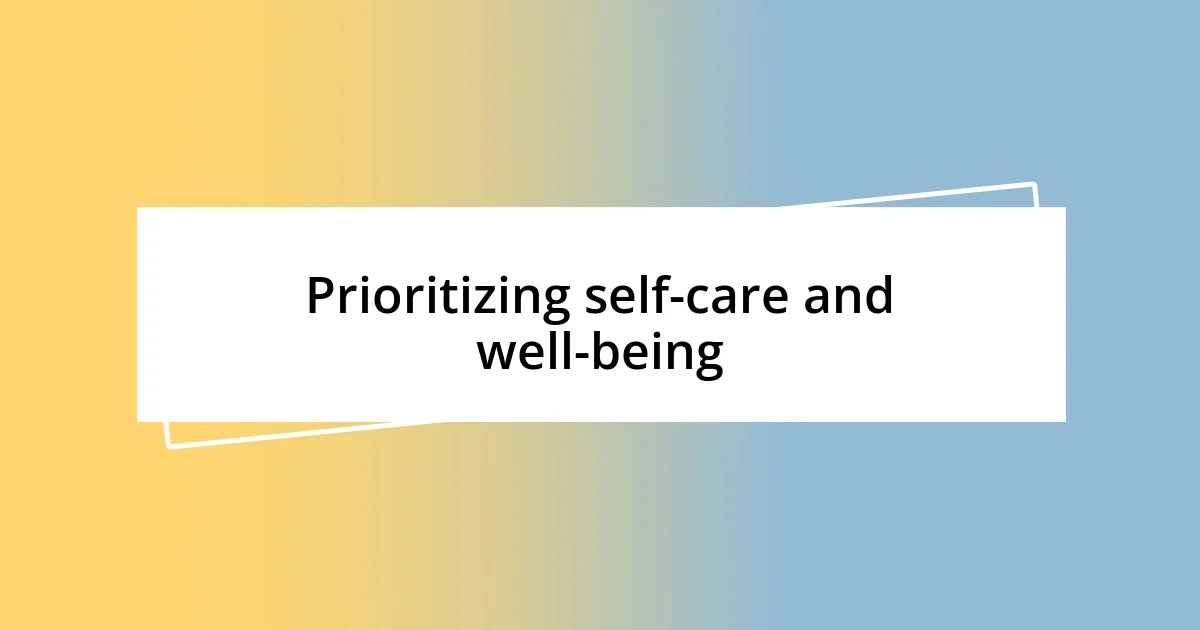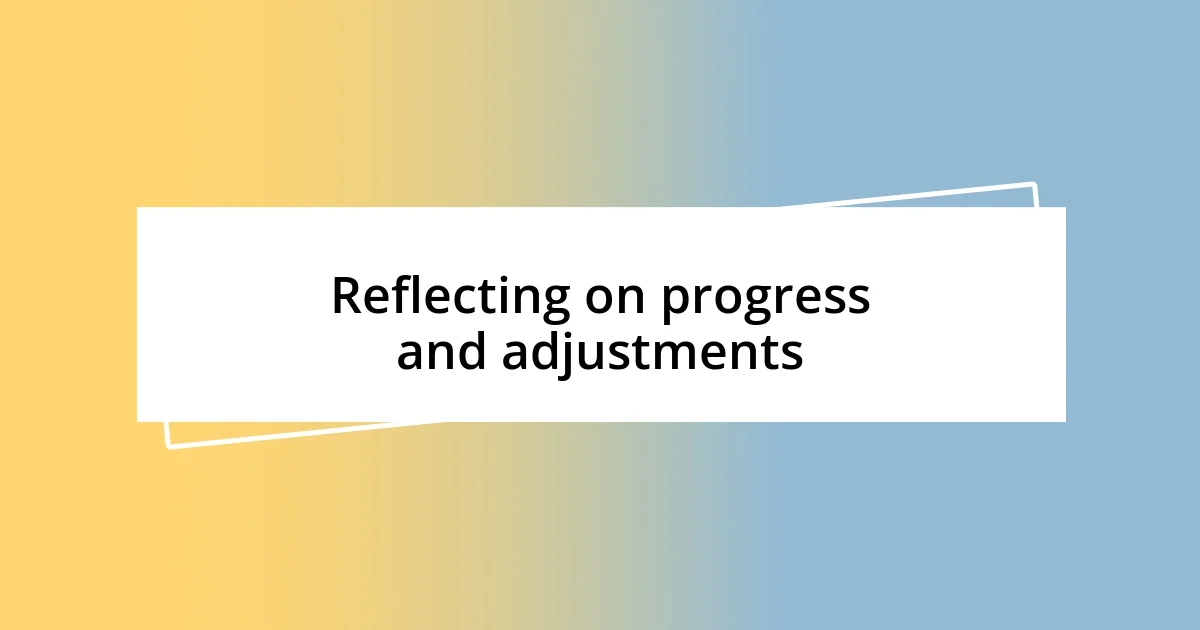Key takeaways:
- Embrace the duality of the writing life, recognizing that vulnerability and self-doubt are part of the creative journey.
- Set realistic writing goals that are flexible, allowing for progress over perfection to maintain a balanced life.
- Create a supportive writing environment and establish a daily routine that honors creativity while prioritizing self-care and well-being.

Understanding the writing life
Writing isn’t just about putting words on a page; it’s a journey filled with ups and downs. I remember the thrill of finishing my first piece—it was like climbing a mountain. But then came the self-doubt, asking myself, “Was it good enough?” This duality of joy and insecurity defines much of the writing life.
Every writer faces the challenge of finding their voice—the struggle can often feel isolating. I’ve spent countless evenings tinkering with my sentences, only to realize later that the most authentic parts of my work are often the ones I nearly discarded. Have you ever had a moment where you doubted your abilities while writing? It’s in those moments that I remind myself that vulnerability is part of the process.
However, it’s essential to acknowledge the rhythm of writing; it’s not a sprint but a marathon. I’ve learned to embrace the creative ebbs and flows, understanding that some days the words flow effortlessly, while others feel like a chore. That acceptance has transformed my approach—what if we viewed writer’s block not as a hindrance but as a chance to recharge? This mindset shift can open doors to deeper creativity and exploration.

Setting realistic writing goals
Setting realistic writing goals is crucial for maintaining a balanced life. I find that rather than setting mile-high targets, small, achievable goals work best. For instance, committing to writing just 300 words a day can seem less daunting than the idea of completing an entire chapter in one sitting. This approach not only mitigates pressure but also fosters a consistent writing habit.
One critical thing I’ve learned is to factor in flexibility with my writing goals. Life can throw unexpected curveballs—whether it’s a family obligation or an unforeseen work deadline. When I focus on progress instead of perfection, I grant myself permission to adjust my goals. Have you ever felt the relief of easing up on a self-imposed deadline? It’s liberating to realize that writing should enhance, not hinder, our daily lives.
It can be motivating to chart my progress, but I also like to compare my goals periodically. This helps me gauge whether I’m on track or if adjustments are needed. Setting realistic goals isn’t just about the quantity of words; it’s about honoring my creative process while ensuring I don’t burn out.
| Goal Type | Description |
|---|---|
| Short-term | Daily writing targets, such as 300 words. |
| Medium-term | Completing a specific project or draft in weeks. |
| Long-term | Publishing a novel or finding a literary agent. |

Creating a supportive environment
Creating a supportive environment around my writing practice has made all the difference. I once realized that writing at my kitchen table, amidst the chaos of daily life, was draining my creativity. I needed a space that felt exclusive to my craft—a quiet nook filled with my favorite books and mementos. This small change brought clarity and focus, allowing me to dig deeper into my writing without distractions.
To nurture that supportive atmosphere, consider these elements:
- Dedicated Space: Find a specific area in your home or office that feels like your own writing sanctuary.
- Positive Influences: Surround yourself with books, art, or quotes that inspire you.
- Distraction-Free Zone: Silence your phone and limit social media to minimize interruptions during writing sessions.
- Supportive Community: Engage with fellow writers through workshops or online forums to foster encouragement and motivation.
- Personal Rituals: Establish a pre-writing routine, like brewing a cup of tea or taking a few minutes of mindfulness, to signal your mind it’s time to create.
I also believe that sharing my writing journey with loved ones has been incredibly rewarding. When I acknowledge my creative endeavors with friends and family, their support becomes a cushion during my low moments. I remember a time when I felt utterly defeated after receiving feedback on a draft. Instead of hiding away, I shared my feelings with a close friend. She reminded me that it’s all part of growth, and her encouraging words reignited my passion. Don’t underestimate the power of community; it can be a lifeline when the writing path gets rocky.

Establishing a daily routine
Establishing a daily routine has been a game-changer in my writing journey. I find that writing first thing in the morning helps me tap into that fresh energy and creativity. There’s something magical about those quiet hours before the world wakes up—it’s when I feel most connected to my ideas. Have you ever tried writing at a specific time each day? It can truly transform how you approach the task.
Once I committed to a morning routine, I wanted to refine it further by including specific rituals. For instance, I’ve started lighting a candle each morning before I write; it sets the mood and signals to my brain that it’s time to focus. Little touches like this create a comforting atmosphere that feels intentional and inviting. Also, having a clear start and end time for my writing sessions helps me avoid that dreaded feeling of writing endlessly without direction.
Of course, life has its way of interrupting even the best-planned routines. I recall a particularly hectic week when family commitments seemed to consume my schedule. Instead of panicking, I simply adjusted my writing sessions to the evenings. It was a reminder that flexibility is just as important as consistency—sometimes, life demands a shift, and that’s perfectly okay. Have you allowed your routine to adapt to your life? The key is to keep the writing alive, no matter the time of day.

Prioritizing self-care and well-being
Taking time for self-care and well-being is essential in maintaining the balance between writing and life. I remember a period when I was so immersed in my projects that I neglected my own needs. My daily walks—something I used to cherish—became nonexistent. When I finally prioritized that simple act of stepping outside, I found my creativity reawakening. Have you noticed how fresh air can spark new ideas?
Mindfulness practices have also been a significant part of my self-care routine. I stumbled upon meditation during a particularly stressful writing block. At first, I was skeptical. But after just a few minutes each day, I noticed a remarkable shift in my focus and clarity. It helped clear away the mental clutter and allowed my thoughts to flow freely. Have you ever tried taking a few minutes to breathe deeply before diving into your writing?
Remember, self-care isn’t just a buzzword—it’s a necessity. I’ve learned that celebrating small achievements, whether it’s completing a chapter or simply showing up to write, brings immense joy and motivation. I started treating each completed piece as a reason to indulge in my favorite treat—like a piece of dark chocolate or a cozy movie night. This approach not only boosts my morale but also reinforces the idea that taking care of myself is intertwined with my writing journey. How do you reward yourself for your hard work? It’s moments like these that can keep your passion alive.

Utilizing productivity tools
Productivity tools have become my best allies in managing writing alongside life’s myriad distractions. For instance, I recently discovered a task management app that allows me to break my writing goals into manageable chunks. This not only keeps me organized but also gives me that rewarding sense of accomplishment with every task I complete. Have you ever experienced the rush of checking something off your list? It’s incredibly motivating!
I also rely heavily on speech-to-text software during those moments when my fingers just can’t keep up with my thoughts. I vividly remember a particularly inspiring walk when the ideas flowed so rapidly that I struggled to jot them down before they slipped away. Using this tool transformed that experience; I could capture my ideas in real time without losing momentum. Have you ever felt the frustration of a great idea wavering just out of reach? Productivity tools can bridge that gap, keeping your creative spark alive.
Another invaluable tool for me has been a focus timer. I set it for short intervals of intense writing, followed by brief breaks to recharge. Interestingly, I’ve found this rhythm mimics the pace of life itself. It’s almost like a dance—write, pause, reflect. These sessions create a satisfying flow that enhances my output without leading to burnout. What methods do you use to maintain your focus? For me, the right tools make all the difference in creating a balance that honors both my writing and personal life.

Reflecting on progress and adjustments
Reflecting on my writing journey often reveals surprising insights about my progress. There was a time when I felt overwhelmed and stagnant, convinced that my words weren’t flowing as they should. I started keeping a journal to document my daily writing experiences, and flipping back through the pages, I realized how far I’ve come. Isn’t it amazing how reflecting on past struggles can shine a light on our growth?
I also find it crucial to adjust my writing strategy based on what’s working and what’s not. Last year, I experimented with writing prompts, initially thinking they would stifle my creativity. Instead, they unlocked new pathways in my brain and helped me step out of my comfort zone. Have you ever tried a method that surprised you with its effectiveness? These moments of adaptation remind me that flexibility is key to finding joy in writing.
Moreover, I’ve learned to celebrate not just my finished pieces but also the small wins along the way. Recently, I completed a challenging article that took weeks to research and write. I took time to appreciate the effort and thought that went into it, even if the end result isn’t perfect. How do you celebrate your achievements? I’ve found that acknowledging these milestones cultivates a deeper sense of fulfillment in the creative process.














